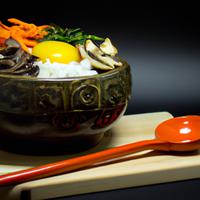
1 serving (500 grams) contains 600 calories, 25.0 grams of protein, 15.0 grams of fat, and 80.0 grams of carbohydrates.

Log this food in SnapCalorie

Nutrition Information
Calories |
288 | ||
|---|---|---|---|
% Daily Value* |
|||
| Total Fat | 7.2 g | 9% | |
| Saturated Fat | 2.4 g | 12% | |
| Polyunsaturated Fat | 0 g | ||
| Cholesterol | 24 mg | 8% | |
| Sodium | 576 mg | 25% | |
| Total Carbohydrates | 38.4 g | 13% | |
| Dietary Fiber | 2.4 g | 8% | |
| Sugars | 4.8 g | ||
| protein | 12 g | 24% | |
| Vitamin D | 0 mcg | 0% | |
| Calcium | 48 mg | 3% | |
| Iron | 1.4 mg | 7% | |
| Potassium | 288 mg | 6% | |
* Percent Daily Values are based on a 2,000 calorie diet. Your daily values may be higher or lower depending on your calorie needs.
Food Attributes
Source of Calories
About Bi bim bap
Bibimbap is a classic Korean dish known for its vibrant presentation and balanced nutrition. This one-bowl meal typically includes steamed white rice topped with an assortment of sautéed vegetables like spinach, zucchini, bean sprouts, and carrots, often arranged in colorful sections. Common additions include protein such as beef, chicken, tofu, or a fried egg. The dish is completed with a dollop of gochujang, a spicy-sweet chili paste, adding depth of flavor. Bibimbap is nutrient-rich, offering a variety of vitamins and minerals from the vegetables and healthy fats from the egg and protein. Its high fiber content promotes digestive health, while lean protein supports muscle growth. However, variations with higher amounts of oil or refined ingredients may impact calorie content. Overall, Bibimbap is a well-balanced meal that showcases the harmony of flavors and textures in Korean cuisine, offering both taste and nourishment.



